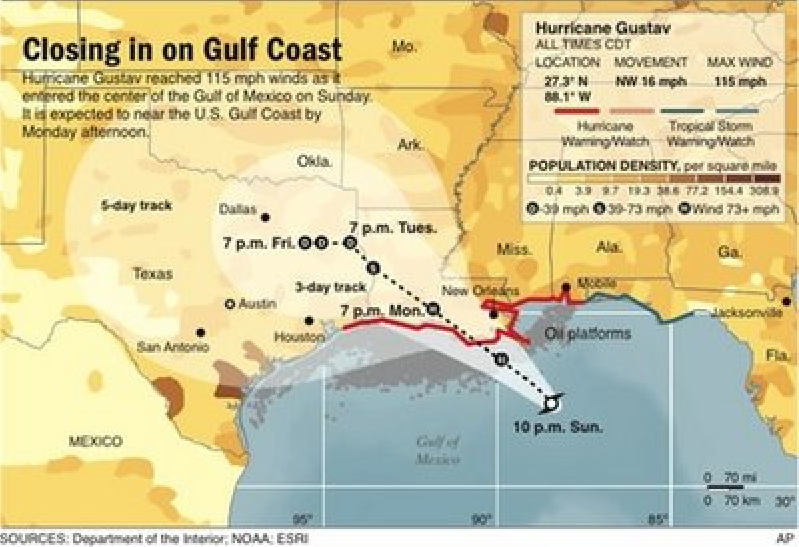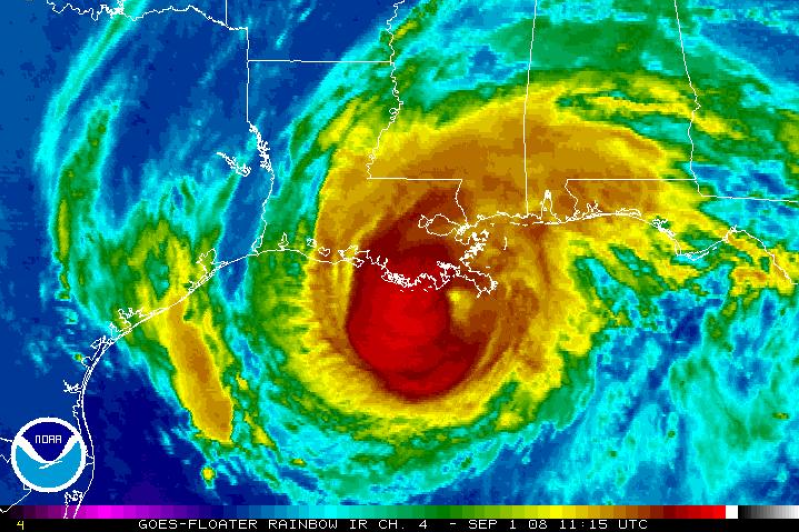

NEW ORLEANS (AP) - Hurricane Gustav charged toward the largely deserted coast of Louisiana early Monday morning and seemed destined to make landfall west of a city still recovering three years after Katrina's devastating blow.
Those who heeded the days of warnings to get out watched from shelters and hotel rooms hundreds of miles away, praying the powerful Category 3 storm and its 115-mph winds would pass without the same deadly toll.
"We're nervous, but we just have to keep trusting in God that we don't get the water again," said Lyndon Guidry, who hit the road for Florida just a few months after he was able to return to his home in New Orleans. "We just have to put our faith in God."
The brutal memories of Katrina, which flooded 80 percent of New Orleans and killed more than 1,600 along the Gulf Coast, led officials to aggressively insist that everyone in Gustav's path flee from shore. As the storm grew near, the streets of the city were empty — save for National Guardsmen and just about every officer on the city's police force standing watch for looters.
In all, nearly 2 million people left south Louisiana, as did tens of thousands from coastal Mississippi, Alabama and southeastern Texas.
Even presidential politics took a back seat to the storm, as the Republican Party scaled back its convention plans in deference to Gustav's threat. Mindful of the government's inept response to Katrina, President Bush planned to head to Texas, where emergency response personnel were getting ready to head into the storm zone.
"It's amazing. It makes me feel really good that so many people are saying, 'We as Americans, we as the world, have to get this right this time,'" New Orleans Mayor Ray Nagin said. "We cannot afford to screw up again."
Gustav killed at least 94 people as it tore through the Caribbean and it will test three years of planning and rebuilding on the Gulf Coast following Katrina's wrath. Billions of dollars were at stake, as Gustav threatened industries ranging from sugar to shipping. If production is significantly interrupted from the region's refineries and offshore oil and gas platforms, price spikes could hit all Americans at the pump.
Officials promised they were ready to respond this time. Homeland Security Secretary Michael Chertoff said search and rescue would be the top priority once the storm passed: high-water vehicles, helicopters and fixed-wing aircraft, Coast Guard cutters and a Navy vessel that is essentially a floating emergency room were posted around the strike zone.
"I feel a little nervous about the storm and exactly where it's going to end up, but I also feel real good about the resources," Nagin said. "Man, if we have resources, we can move mountains."
Forecasters had expected Gustav to strengthen further before making landfall around midday, but early Monday they said the storm would hold steady as a Category 3, packing winds of 115 mph. Katrina also made landfall as a strong Category 3, which carries sustained winds of between 111 mph and 130 mph.
At 5 a.m. EDT Monday, the National Hurricane Center said Gustav was centered about 115 miles south-southeast of New Orleans and was moving northwest near 16 mph.
Tropical storm-force winds had reached the southeastern tip of the state early Monday morning, but local officials said they had not received any distress calls or reports of unexpected flooding.
In Plaquemines Parish, south of New Orleans, officials built an emergency levee to prevent flooding along a highway that runs along the Mississippi River channel, sheriff's spokesman Maj. John Marie said.
But it was extremely quiet early Monday morning. "It's really remarkable, we got almost everybody out," he said.
Deputies went door to door and identified about 12 people who planned to ride out the storm.
"When you have a kid in their 20s, he feels invincible," Marie said. "We have the reverse problem: We have elderly folks who have been through so many storms, they think they'll be fine. This one is a little more dangerous."
In New Orleans, officials were anxiously watching to see what kind of storm surge the city could face: If forecasts hold, the city could experience a storm surge of only 4 to 6 feet, compared to a surge of 10 to 14 feet at the site of landfall, said Corey Walton, a hurricane support meteorologist with the National Hurricane Center.
Katrina, by comparison, brought a storm surge of 25 feet, causing levees to break. While the Army Corps of Engineers has shored up some of the city's levee system since then, fears this time center on the city's West Bank, where levee repairs have not been completed.
Fears of another Katrina led Nagin and Gov. Bobby Jindal to order a massive evacuation that succeeded in removing 90 percent of the population from southern Louisiana. It continued late into the evening hours Sunday, with Jindal issuing a final plea for evacuation by the estimated 100,000 people who decided to stay.
Adam Woods didn't need the reminder. A Coast Guard helicopter plucked him off his roof after Katrina, and this time, he and his lab mix Mandela headed to the city's Union Station for a ride out of town.
"I've got oxygen in my lungs," the 53-year-old landscaper said. "Remember, you've got to be alive to have problems."
The final train out of New Orleans left with fewer than 100 people on board, while one of the last buses to make the rounds of the city pulled into Union Station empty. Every officer in the department was on duty as police made their final rounds around 7 p.m.
"When the 911 calls start coming in, we'll know how many people are left in town," said police superintendent Warren Riley.
The city's emergency medical service had received only 26 calls as of midnight Monday, a fraction of what they received on the night before Katrina, spokesman Jeb Tate said.
Jeffrey Carreras was among those staying behind. Looters wreaked havoc in his neighborhood restaurant in the days after Katrina struck and despite promises of police protection, he wasn't willing to leave his business a second time.
"I have shotguns, rifles. I collect guns actually," Carreras said. "So I have plenty of guns in there, plenty of ammo."
Gustav was the seventh named storm in the Atlantic hurricane season. The eighth, Tropical Storm Hanna, was strengthening about 100 miles from the Bahamas. Though a storm's track and intensity are difficult to predict days in advance, long-term projections showed the storm could come ashore along the border of Georgia and South Carolina late in the week.
___
Associated Press writers Becky Bohrer, Janet McConnaughey, Robert Tanner, Cain Burdeau, Alan Sayre, and Allen G. Breed contributed to this report from New Orleans. Vicki Smith in Houma and Doug Simpson in Baton Rouge also contributed. Michael Kunzelman reported from Lafayette, La.
Copyright 2008 Associated Press. All rights reserved. This material may not be published, broadcast, rewritten, or redistributed.







